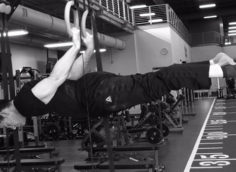The longer you lift, the harder it becomes to continue making progress. During the beginning stages, you'll be able to add weight to the bar easily. Upping your poundage by 5-10 pounds total on your upper-body lifts and 10-20 pounds on lower-body lifts is doable in the first few months.
From the six-month mark onward, things change. It becomes ever more difficult to continue going heavier. At this point, a change of pace is necessary to keep the gains coming.
One of the best ways to defeat a plateau is the double progression method.
Here's the Gist
You pick a rep range and stick with the same weight for as long as needed to reach the greatest number of reps you can hit with good form (1). Once you can hit your top-end reps for each set with your working weight, you up the poundage and reduce the reps back to the low end of your chosen rep range.
Let's say a lifter hits a plateau on a squat at 3 sets of 3 reps with 250 pounds. Instead of trying 260 and getting sloppy with technique, he sets his rep range at 3-6 reps using the double progression method.
Here's how his squat workout may look for 8 weeks:
| Week | Sets/Reps | Weight | Week | Sets/Reps | Weight |
|---|---|---|---|---|---|
| 1 | 3x3 | 250 lb. | 5 | 3x3 | 260 lb. |
| 2 | 3x4 | 250 lb. | 6 | 3x4 | 260 lb. |
| 3 | 3x5 | 250 lb. | 7 | 3x5 | 260 lb. |
| 4 | 3x6 | 250 lb. | 8 | 3x6 | 260 lb. |
This form of progression is a great way to gain confidence under the bar. Upping your reps with a set weight allows you to "own the weight," which will help you feel more comfortable going to a slightly higher weight with a reduced number of reps.
Adding more reps with a given load also gives your body time to build up the supporting fascial, tendon, and ligament strength required to safely lift heavier loads in the future.
Source
- McRobert, S. (2012). Beyond BRAWN: The insider's encyclopedia on how to build Muscle & might. In Beyond brawn: The insider's encyclopedia on how to build muscle & might (pp. 160-161). Nicosia, Cyprus: CS Pub.





